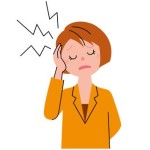 A combination of nutrition and hands-on therapy is usually very effective in treating headaches. Detoxification is one possible way to bring headaches under control. Simple things work very well in treating headaches. Often people who get headaches have habits that are causing the headaches, but have not made the connection between their lifestyle and their symptoms.
A combination of nutrition and hands-on therapy is usually very effective in treating headaches. Detoxification is one possible way to bring headaches under control. Simple things work very well in treating headaches. Often people who get headaches have habits that are causing the headaches, but have not made the connection between their lifestyle and their symptoms.
One obvious thing that can be done is to quit eating refined sugar and to eat regular meals. Research that appeared in the journal Headache (May 1978;18:91-94) a study appeared that looked at 74 subjects who suffered from migraine headaches and their blood sugar levels. The subjects were give glucose tolerance tests (GTT) and it was found that six of the patients had results that suggested diabetes and 56 had results that suggested reactive hypoglycemia. A diet free of sucrose, and eating six small meals per day improved the GTT results in most of the six patients with the diabetic patterns and half of those subjects became headache free. Of the 56 subjects with the hypoglycemic GTT result, of the 43 subjects who returned for a follow up, just about every one had improvement of their GTT curve and reduction in pain.
The kinds of fats in the diet can affect whether or not you have headaches. One article appearing in the journal Medical Hypotheses (1998;50:1-7) postulated that migraines may be linked to blood lipids, much the same way that cardiovascular disease is. Research appearing in the American Journal of Clinical Nutrition (1985;41:874) found that supplementation with fish oil reduced the frequency and severity of migraine headaches. Indeed, many research articles have shown the value for omega-3 fatty acids for pain and inflammation.
B vitamins may be of value for migraine patients in the same way that bringing blood sugar under control is helpful. Also, there is some research to show that high dose of riboflavin can help migraine patients. Research appearing in the journal Cephalgia (1994;14:328-329) tested the results of giving 400 mg/day of riboflavin to subjects with migraine headaches. Half of the subjects were also given 75 mg. of aspirin. There was a mean global improvement of a little over 68% in the headache scores. The group receiving the aspirin did no better than the group receiving riboflavin alone. The European Journal of Neurology (2004;11:475-477) also ran a study that found that giving riboflavin reduced the frequency of headaches and the use of medication.
Magnesium is so well researched that it should always be considered for patients with headaches. One article appearing in the journal Vitamins and Hormones (2004;69:297-312) spoke of the value of magnesium, coenzyme Q10 and vitamin B12 for headache patients.






